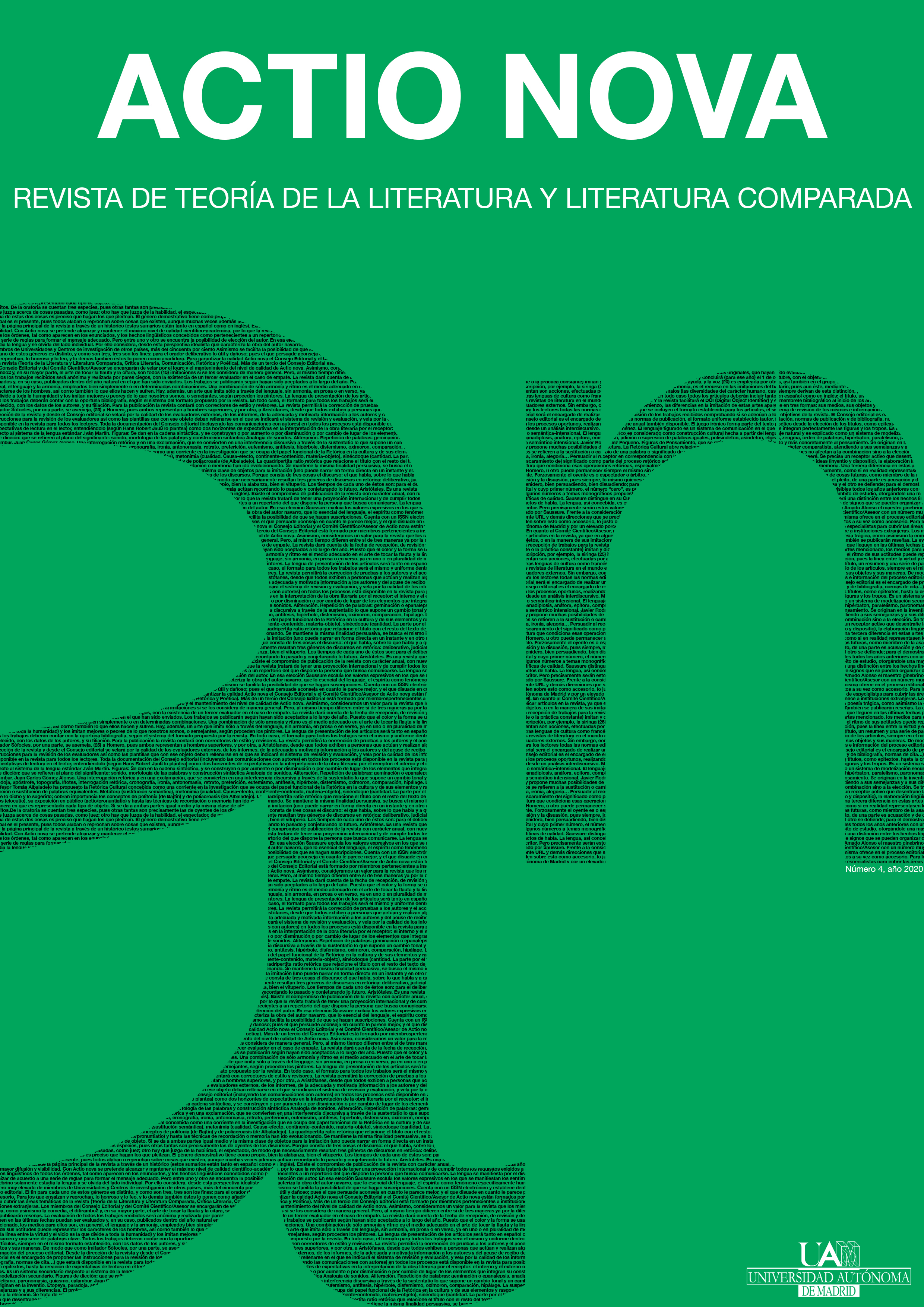Keywords:
Contemporary narrative, Short stories, MurakamiCopyright (c) 2020 Heraclia CASTELLÓN ALCALÁ

This work is licensed under a Creative Commons Attribution-NonCommercial 3.0 Unported License.
Abstract
The article addresses the Murakami set of short stories translated into Spanish, a total of fifty-five short stories, collected -except one - in four compilation volumes: The Elephant Vanishes, Blind Willow, Sleeping Woman, After the Earthquake and Men without Women. . It seeks to recognize the uniqueness of each of these works, and at the same time the marks of the author's narrative. To do this, the thematic landscape that each of these compilations offers is taken into account. . It is pertinent to trace how each of these books has been devised, and the links that could be found with the author's global work. Along with the registration of thematic material, it is interesting to reckon the possible use of Murakami narrative procedures.
Downloads
References
Bernárdez, Aurora y Carlos Álvarez Garriga, Eds. (2013): Julio Cortázar. Clases de literatura, Berkeley 1980, Buenos Aires, Alfaguara.
Castellón Alcalá, Heraclia (2019): «Lo real y lo fantástico en los cuentos de Sauce ciego, mujer dormida de Murakami», Sincronía, 23, 76: 545-562. http://sincronia.cucsh.udg.mx/articulos_76_html/545-562_2019b.html (último acceso: 01/05/2020). https://doi.org/10.32870/sincronia.axxiii.n76.27b19
Castellón Alcalá, H. (2020): «El universo narrativo de Haruki Murakami en algunos cuentos de Hombres sin mujeres», https://doi.org/10.15446/lthc.v22n1.82300
Literatura: teoría, historia, crítica, 22, 1: 271-305. https://revistas.unal.edu.co/index.php/lthc/article/view/82300 (último acceso: 01/05/2020). https://doi.org/10.15446/lthc.v22n1.82300
Fisketjon, Gary L.(2004): A Letter from the Editor of The Elephant Vanishes, December 2004 http://www.harukimurakami.com/resource_category/q_and_a/editors-letter (último acceso: 13/05/2020)
Garzón, Raquel (2019): «Haruki Murakami: «El trabajo de un novelista es soñar despierto», El País Semanal 1 de Febrero de 2019: 57-61.
González Torres, A. (2007): «Haruki Murakami: Los centros excéntricos», Quimera 289, Diciembre: 41-43. http://sobreperdonar.blogspot.com/2012/10/haruki-murakami-los-centros-excentricos.html (último acceso: 08/12/2019)
Libedinsky, Juana (2015): «Haruki Murakami: Escribo cosas raras, muy raras», entrevista en La Nación, 3 julio 2015, https://www.lanacion.com.ar/cultura/haruki-murakami-escribo-cosas-raras-muy-raras-nid1807208 (último acceso: 22/05/20)
Mori, Naoka (2014): «Murakami Haruki y España». Kokoro, 16: 2-12.
Murakami, Haruki (2008): Sauce ciego, mujer dormida, traducido al español por Lourdes Porta Fuentes, Barcelona, Tusquets. Edición digital.
Murakami, Haruki (2013): Después del terremoto, traducido al español por Lourdes Porta Fuentes, Barcelona, Tusquets. Edición digital.
Murakami, Haruki (2015): Hombres sin mujeres, traducido al español por Gabriel Álvarez Martínez, Barcelona, Tusquets.
Murakami, Haruki (2016): El elefante desaparece, traducido al español por Fernando Cordobés González y Yoko Ogihara, Barcelona, Tusquets. Edición digital.
Murakami, Haruki (2017): De qué hablo cuando hablo de escribir, traducido al español por Fernando Cordobés González y Yoko Ogihara, Barcelona, Tusquets. Edición digital.
Quiroga, Horacio (1927): Decálogo del perfecto cuentista. https://soyliterauta.com/decalogo-del-cuentista-perfecto-quiroga/ (último acceso: 10/05/2020).
Rubin, Jay (2015). The Magical Art of Translation: From Haruki Murakami to Japan's Latest Storytellers. JapanSociety NYC 11 de mayo de 2015. https://www.youtube.com/ watch?v= U4qtvGTaRto 10'38¨- 10'45'' (último acceso: 26/05/2020).
Rubio, Carlos. (2012): El Japón de Murakami, Madrid, Aguilar.
Sotelo, Justo (2013): Los mundos de Murakami, Madrid, Izana Editores.
Wray, John (2004): «Haruki Murakami, The Art of Fiction No. 182», en The Paris Review, 170. https://www.theparisreview.org/interviews/2/the-art-of-fiction-no-182-haruki-murakami (último acceso 26/05/2020).
